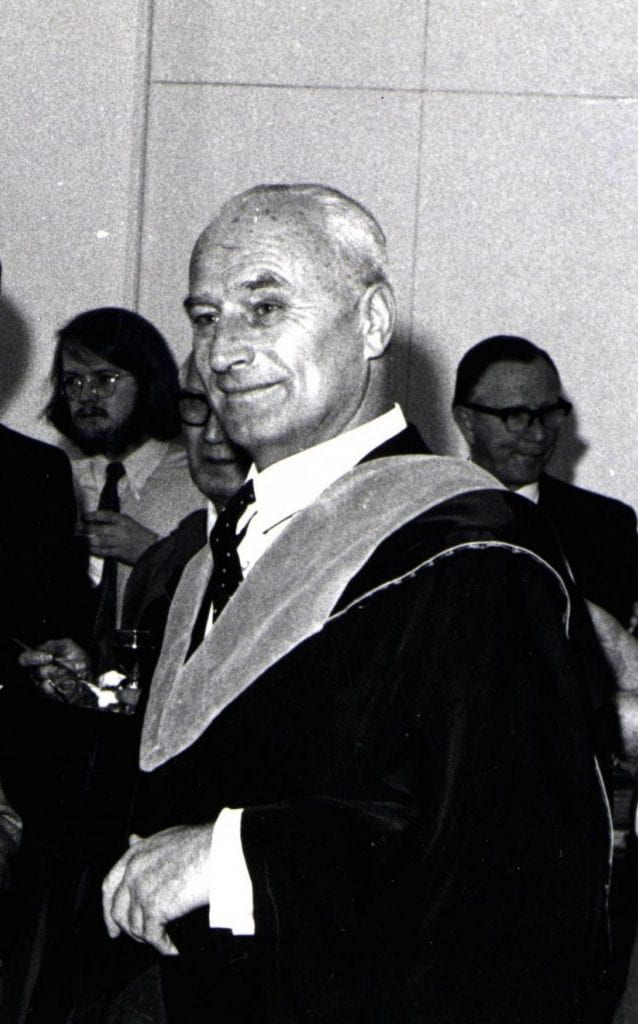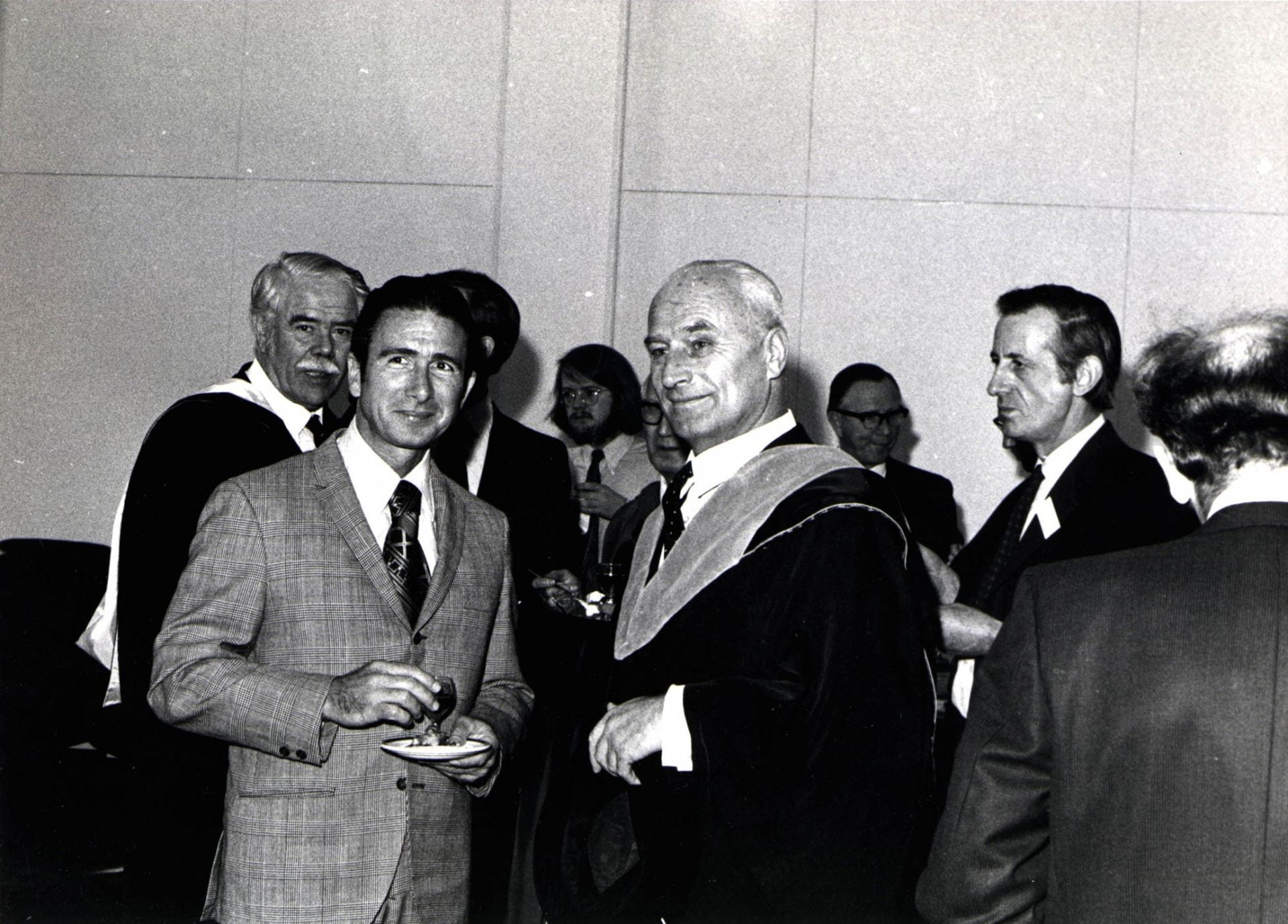by Stephen Penton and Conor Jackson
City Archive holds a number of pieces of material relating to space and space travel. This all relates to today’s Department of Mechanical Engineering and Aeronautics. One of the earliest departments when the Northampton Institute was founded in 1897 was Mechanical Engineering, and soon after in 1909 City was one of the first universities to introduce Aeronautical Engineering courses.
One of the Heads of Departments of the Aeronautics Department was Grigori Tokaty. Professor Tokaty had a highly successful career as an aeronautical engineer in the USSR, becoming chief rocket scientist in 1947.1 However, shortly afterwards he defected to the UK and has been described as ‘…one of the most prominent Cold War defectors’ (Dylan, 2018).2 He was a Professor at City between 1967 and 1975, and invited a number of eminent people involved in space to City during this time.

Professor Tokaty invited the astronauts David Scott, Alfred Worden and James Irwin to visit City in November 1971, shortly after they had visited the Moon on the Apollo 15 mission. A short amateur film was made of the occasion, including footage of their arrival, and of a ceremony in the Great Hall. City still has this film in the Archive.
The mission was launched from Kennedy Space Centre in Florida, using a spacecraft called Endeavour. It took nearly 100 hours to reach the moon. Once there, Scott and Irwin descended to the moon’s surface in a smaller vehicle called Falcon, and then used a Lunar Roving Vehicle to travel on the Moon (altogether it covered 17 miles). There was a greater emphasis on science than in earlier Apollo missions, particularly geology, with samples from the Moon’s surface taken and transported back to Earth. 18.5 hours were spent outside the spacecraft in all on the mission – this was a record at the time for one mission.3
In the ceremony at City the astronauts presented the University with a photograph of the Lunar Roving Vehicle, and a piece of the heat shield from the Endeavour spacecraft, both of which are still at City.

In the Autumn of 1974 – 31st October to be exact – Professor Tokaty invited science writer and novelist Arthur C. Clarke to deliver a lecture titled “The Promise of Space”. The lecture was captured using cassette tape and forms part of the modest audio-visual collection in the Archive.
The use of cassette tapes were fine for 1974, though they present an issue in 2019: this type of media is liable to degrade over time through over-playing, poor maintenance and poor playback equipment. To mitigate against any unknown deterioration and potential loss, it became apparent that the Clarke lecture would need to be digitised. The digitisation process was reasonably simple:
- Download recording software.
- Connect a tape player to a PC sound card or microphone
- Insert a tape and record.
The device used to carry out the recording was a boombox-style CD and tape player from the early 2000s. I had misgivings about the basic set-up, but the quality of the recording was satisfactory for our purpose and the only drawbacks were some warm and fuzzy noises and a reduced volume at certain points in the recording. This certainly gave the recording an authentic feel, though a more refined sound was achieved using tools from the recording software.
Clarke may be best known for his fiction, but he was also something of a futurist, so we were hopeful that the lecture would contain correct predictions about technology to come. This proved to be the case as he made prescient remarks about email, digital newspapers and the internet. We transcribed a section of the tape where he discusses this in more detail:
We’re going to see things coming in like the global satellite post office. Instead of having the physical delivery of mail, which is getting more and more difficult and slower and slower, we will just get at least our commercial mail through electronic links in a few microseconds or a few milliseconds instead of a few weeks it sometimes takes now. The global electronic newspaper – the time’s going to come when you will just dial some coding in your home and you will see the front page of any newspaper in the world, if you can still use the word newspaper in that context and get through satellite links not only the current news media, but every newspaper that has ever been, every book that has ever been right back to the invention of the printing press, in fact all of the knowledge of mankind could be available to you in your home through such a device when you dial the correct thirty digit number. There’s a little problem in information retrieval here but we’re going to solve that, we have to.

More than 40 years have passed since City welcomed Arthur C. Clarke and the astronauts of the Apollo 15 mission and much has changed about space and space travel in the intervening years. It is impossible to know what connection City may have with space in the future, but with the advent of space tourism it may be alumni who come back to visit us.
References
1. White, S (1971) ‘Tokaty, space pioneer.’ New scientist and science journal, 8th July 1971.
2. Dylan, A. (2018) ‘SIS, Grigori Tokaev, and the London Controlling Section: New Perspectives on a Cold War Defector and Cold War Deception.’ War in History, 26(4) pp. 517-538.
3. ‘Apollo 15’ (2019) Wikipedia. Available at https://en.wikipedia.org/wiki/Apollo_15 (Accessed 16th October 2019)
